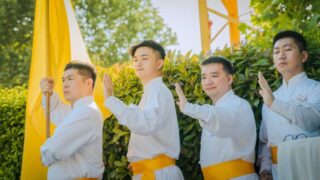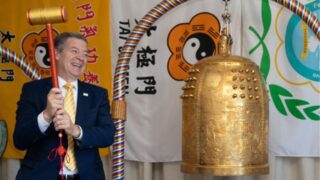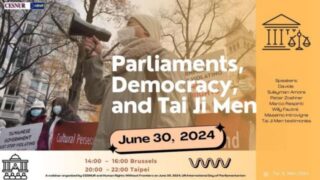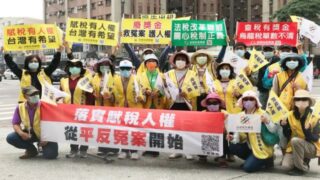Scholars from different countries and Tai Ji Men dizi celebrated the United Nations International Day of Living Together in Peace through a webinar.
by Daniela Bovolenta
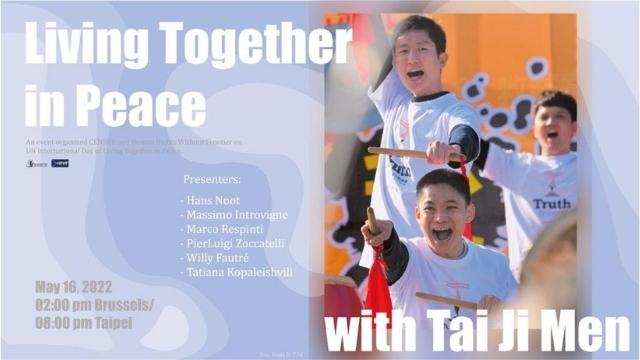

On May 16, 2022, the United Nations International Day of Living Together in Peace, CESNUR, the Center for Studies on New Religious, and Human Rights Without Frontiers, organized one of their bi-monthly webinars on the Tai Ji Men case.
The webinar was introduced by Hans Noot, president of the Dutch Gerard Noodt Foundation for Freedom of Religion or Belief, who mentioned his training in international peace negotiations by a professor who had helped mediating between Israelis and Palestinians. He taught him that understanding and respecting the religious dimension is needed to solve most international conflicts.
Noot also mentioned that on May 9–13, 2022, the 3rd International Review Conference on the National Reports of the Two Covenants was held in Taiwan, where an independent Review Committee of experts examined Taiwan’s compliance with the International Covenant on Civil and Political Rights and the International Covenant on Economic, Social and Cultural Rights, which Taiwan incorporated into its domestic law in 2009. While otherwise interesting, the report of the Committee did not address freedom of religion or belief (FORB) and tax justice issues, whose importance in Taiwan is demonstrated by the Tai Ji Men case. Noot also presented a video on the Review Conference.
Massimo Introvigne, an Italian sociologist who serves as managing director of CESNUR and editor-in-chief of Bitter Winter, observed that “living together in peace” requires acknowledging conscience as the moral compass of everybody, a key point in the teachings of Dr. Hong Tao-Tze, the leader of Tai Mi Men. Introvigne mentioned his visit during a recent conference in Leuven, Belgium, to the grave and shrine of Damien De Veuster, a Belgian Catholic priest who in 1873 decided to spend the rest of his life in the Hawaiian island of Molokai, where those suffering of leprosy were “dumped” and left to their own devices.
Although united by a common suffering, Introvigne noted, the lepers did not live in an idyllic peaceful settlement: there was no police, and violence and abuse were common. The lepers had somewhat lost contact with their own consciences. It was only when Father Damien re-awakened their consciences that some order was restored.
How much Dr. Hong contributed to spreading the idea that without conscience a society can only be dysfunctional is generally acknowledged, Introvigne said, including in Taiwan. What is less acknowledged is the persecution Tai Ji Men and Dr. Hong have been subjected to in Taiwan, notwithstanding their good deeds, by bureaucrats that in old English language would have been called “moral lepers,” an expression no longer used today as it may be offensive to those who suffer of the physical illness (today called Hansen’s disease) popularly known as leprosy.
Marco Respinti, an Italian journalist who serves as director-in-charge of Bitter Winter, reviewed both Dr. Hong and Tai Ji Men’s work for peace and the persecution they suffered in Taiwan. He proposed that both as an acknowledgement of their good work and a restoration of justice after persecution, Tai Ji Men should be nominated for the Word Peace Prize. While only some categories of politicians and academics may make such a proposal to the Norwegian Nobel Committee, Respinti expressed the hope that friends of Tai Ji Men may take this step before the next deadline of January 31, 2023.
PierLuigi Zoccatelli, a professor of Sociology of Religion at Pontifical Salesian University in Torino, Italy, mentioned his studies about the “esoteric paradigm,” and the current academic discussions whether esotericism is a purely Western phenomenon or also appears in Asian and other non-Western cultures. He analyzed Tai Ji Men’s Bell of World Peace and Love as an “esoteric” artifact. Certainly, it has been rang by world leaders of all religions, Zoccatelli said, yet its symbols are rooted in a millenarian Chinese esoteric tradition. To ring the Bell and work for peace, Zoccatelli said, it is not necessary to understand this tradition. However, the tradition and the symbols of the Bell contribute to explain the attitude and enthusiasm of the Tai Ji Men dizi (disciples ).
Willy Fautré, co-founder and director of Human Rights Without Frontiers, introduced a video on Yu Chenglong (1617–1684), the most incorruptible official of the Qing dynasty and an example that may inspire bureaucrats of today.


He then presented the testimonies of five dizi, emphasizing how their experiences come from the sufferings of the Tai Ji Men case, which they interpreted through what Fautré calls the “inexhaustible” richness of Dr. Hong’s teachings on conscience and justice. Fautré also compared the experiences of the witnesses with his own career as an educator and human rights activist.
Tseng Ting-Yu, senior marketing representative of an electronic company, celebrated the efforts of Tai Ji Men and Dr. Hong leading to the inclusion of the International Day of Conscience among the recognized United Nations day of observance. She mentioned that these efforts have been applauded and acknowledged not only internationally but also in Taiwan, including by Presidents and other high-ranking politicians. At the same time, and paradoxically, Tai Ji Men has been persecuted and harassed through illegal tax bills. The Tai Ji Men case, Tseng concluded, is part of a wider problem of tax injustice in Taiwan, which is driven by the immoral system of bonuses given to bureaucrats who enforce tax bills.
Mark Liu, an application engineer working in a semi-conductor industry, shared his professional experience in a booming field. The global success of Taiwan’s semi-conductor industry has been attributed to three factors, Liu said: trust and innovation; strategy; and precise execution of the strategies. Liu mentioned these factors because, in his opinion, these are precisely those lacking in Taiwan’s handling of human rights, as evidenced by both the Tai Ji Men case and the fact that only 26.3% of the Taiwanese, according to polls, trust the local judiciary to be fair and independent.
Lorraine Huang, a graduate student at Saint Louis University, shared a reflection on how dizi reacted to the Tai Ji Men case and to the gross injustice vested on Dr. Hong and on them. First, they were taught by their leader, Dr. Hong, to avoid hate and resentment, a key teaching for those who really want to live together in peace. Second, they expressed their protest by fighting for justice: not only justice for Tai Ji Men, but justice for all the victims of human rights abuses and tax injustice in Taiwan. Third, they understood that the “uneducated conscience” of rogue bureaucrats had created the Tai Ji Men case, which motivated dizi to increase their efforts to spread a culture of conscience both in Taiwan and internationally.
Fautré then introduced a video on the story of Lady Godiva, the wife of a 11th-century Earl of Mercia, in England, who asked her husband to reduce the oppressive taxation he had imposed. The husband told Godiva he would only do so if she would ride on a horse through the streets of Coventry naked. She did, but the good citizens of Coventry closed all their doors and windows and nobody looked at her, which taught her husband a lesson on tax justice. As Fautré recalled, the story of Lady Godiva has inspired countless works of art and at least five different movies.


Daisy Su, an elementary school teacher, reported how she learned the importance and techniques of helping others and solving conflicts in Tai Ji Men. She also shared the painful experience of being lectured to by her supervisor and relatives after the Tai Ji Men case in 1996, as if she had been “cheated.” Dr. Hong, however, taught her and other dizi not to act as “victims,” but proudly stand up for truth and justice.
Ella Li, project manager of a technology company, stated that the International Day of Living Together in Peace is about accepting differences and avoiding discriminations and intolerance. Tai Ji Men has been obviously discriminated in Taiwan, Li said, but her work for tax justice taught her that discrimination is a wider problem in Taiwan. She was very moved when a taxi driver, who was taking her home after a tax reform protest, told her he had once a company that was ruined by ill-founded tax bills. He had to pay and close the company, and went to work as a taxi driver.
Tatiana Kopaleishvili, a post-doctoral researcher at the Department of Religious Studies and Missiology at the Evangelical Theological Faculty (ETF) of Leuven who works at ETF’s ISFORB (Institute for the Study of Freedom of Religion or Belief), concluded the webinar by describing the Tai Ji Men story as “heartbreaking.” Religious and political prejudice and “mere human greed,” she said, created the Tai Ji Men case, which violates the human rights of the dizi not only at the external but only at the deeper internal level, as they are requested to compromise with their conscience, something they do not want to do.
She mentioned examples from her home country, Georgia, and Ukraine to confirm that living together in peace is not easy, and requires conscience and fairness by those in power. In the case of Tai Ji Men, she said, Taiwanese bureaucrats tried to protect their own routine and peace, but they did so by affirming their strength and power and oppressing peaceful citizens.


The webinar concluded with another video, the seventh installment of the series “Unbreakable Bonds,” a very detailed reconstruction of the Tai Ji Men case. It was another testament to how dizi, by fighting for justice and tax reform, help all Taiwanese who are oppressed by limitations to freedom of religion or belief and tax injustice, and just want to live together in peace.



